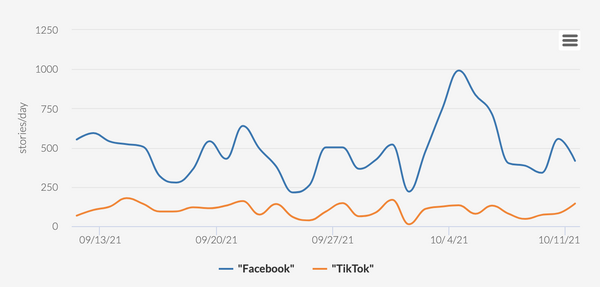
With all the enemies Facebook has at the moment, there’s at least one company that’s happy with what it’s doing: TikTok.
“Big tech” — still in the midst of a techlash — is mostly associated with beleaguered Facebook and almost monopolistic Google. They come with the baggage of the heightened scrutiny of the past decade, an eon in tech years.
TikTok on the other hand is owned by Chinese tech company ByteDance and has been around for only a few years. But things move fast in social media where change is as easy as downloading an app. In short order, TikTok has become a tech behemoth.
In Australia, where the company set up an office last year, it was the second most downloaded app in 2020 after Zoom; 2.5 million Australians were on TikTok in the first half of 2020. That number had risen by more than 50% in six months.
And those millions use it a lot. Data released this year by app analytics company AppAnnie said users spent an average 16.8 hours a month on the platform in 2020, just behind Facebook’s 18.2 but ahead of YouTube on 16.3. (This works out at 42 million hours of TikTok watched by Australians each month!)
The blazing pace seems to have continued into 2021. In September the company reached 1 billion active monthly users worldwide, suggesting there’s plenty of growth potential for users in Australia.
While other tech companies are clearly worried about TikTok’s growth, attention from Australian policymakers and even journalists has lagged. Aside from media cycles around its links to China, much of the attention seems to underestimate the scale of the app’s cultural impact.
As Evelyn Douek points out in The Atlantic, “If you look for TikTok in news coverage, you’re more likely to find it in the lifestyle, culture, or even food section than you are on the front page.”

That’s despite misinformation, conspiracy theory, extremist and harmful content — ranging from promoting eating disorders to self-harm — on the platform, according to mostly international reporting.
The newness of the platform and the young skew of the user base that excludes many of those responsible for regulating or reporting on it (how many Australian politicians or journalists have TikTok accounts that they use to produce content?) mean it hasn’t received the scrutiny it deserves, despite millions of highly engaged Australian users.
Plus TikTok remains a lot more opaque than Facebook, which has transparency features like its Ad Library and content analysis tool CrowdTangle. This means it’s harder to scrutinise from the outside, giving external parties fewer pieces of evidence to critique it.
If anything, TikTok has more concerning aspects than other social networks. The algorithmic engine of the app’s For You Page — the main way videos are consumed — has more sway over what users are shown than other platform’s algorithms, which are more based on who a user chooses to follow. And a younger user base deserves more protection.
As the Morrison government puts social media reform on the agenda, and with a federal election not too far away, TikTok must be on the radar or we’ll be caught fighting the last war.








Surprised that Spud and Scovid and Hastie and Pezzullo have not tried to ban Tik Tok as being a threat to national security (read Liberal Party electoral chances)
Give it time!
If it is true, as reported from the Congressional hearing into FaceBook, that “…a third of Americans get their news from it…” then civilisational collapse cannot be far off.
Not even knowing what the other unsocial thingies are called, much less what they do, I was greatly cheered a fortnight ago when the entire edifice was off-line.
I have not seen so many raised faces & eyes in public, on the street, for a couple of years and thought that overall they’d weathered to loss of their fix quite well, for junkies.
If only there were some way to induce a massive solar flare or EMP event – it would solve a lot of problems.
My daughter added TicToc to her phone and then the router started to complain with
possible DNS-rebind attack detected: redirect-test.flive.ixigua.com
Wikipedia says
This attack can be used to breach a private network by causing the victim’s web browser to access computers at private IP addresses and return the results to the attacker. It can also be employed to use the victim machine for spamming, distributed denial-of-service attacks, or other malicious activities.
This is coming from the TicToc app.
Your evidence it “is coming from the TicToc [sic] app” is…?
OK a bit more information. There’s a partial answer provided to your question here: https://community.spiceworks.com/topic/2333195-tiktok-app-doing-dns-rebind-attacks
I can replicate this:
% dig +noall +answer redirect-test.flive.ixigua.com
redirect-test.flive.ixigua.com. 599 IN A 10.95.3.11
Note it’s the same IP and a TTL of 1 second under 10 minutes. So likely this is not an DNS rebind attack (which by definition requires a much shorter TTL and a rotating resolved IP); likely it’s a misconfigured entry in the DNS, or they’re doing some kind of testing using a non-routable IP.
Still pretty dodgy
James Patterson’s uber-liberal gotcha about privacy is clearly not an outrage shared by the users of social media, especially younger users. They have imprudently abandoned any right to privacy and that abandonment essentially sells out anyone who values privacy; ie we crusty old warriors.